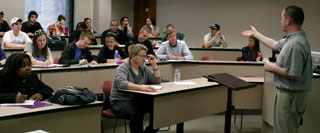Students learn how to become better teachers
“Everybody can be a better teacher, as teachers we need to not only learn from ourselves and our colleagues, but also from literature,” L. Dee Fink told Eastern professors and students on Monday.
L. Dee Fink, education consultant in higher education, presented his methods to improve communication and teaching in “The Joys and Responsibilities of Teaching Well,” a seminar that took place in the Doudna Fine Arts Center.
Among the many points Fink made about how to teach well, he stressed how important it is for a college professor to not only learn about their subjects, but to also learn how to be a better teacher.
Fink established the Instructional Development Program at the University of Oklahoma in 1979, according to the Individual Development and Educational Assessment Center.
He currently works as a national and international consultant on higher education.
Fink displayed a number of books that teach teachers how to teach, including his own “Creating Significant Learning Experiences.”
Fink said only 20 percent of college teachers have ever taken a class on how to design learning experiences.
“We are not doing our jobs sufficiently enough to be in the 21st century,” Fink said. “We are doing good things, but we need to do better.”
“(Fink) covered a lot about the value of professional development and about teachers being consciously aware of their teaching methods and how they can raise the bar. Eastern is a largely teaching institution so its important we focus on the students,” Blair Lord, vice president for academic affairs said.
Fink talked about how employers react to new college graduates.
From his research he said, “Overall employers say that the graduates cant read, write, work in groups, or work with people that are different from themselves very well, but besides that they are good.”
Two thirds of college graduates cannot read at the college level, according to a census from the Adult Literacy Association.
“The people who teach are critical. We are educating the people who have to work together after their higher education, and we need people who can come out of that higher education with the knowledge and how to use it,” Fink said.
Fink gave examples of how to become better teachers such as valuing their responsibilities, taking the time to learn about their subject and their students and different ways of teaching.
Bonnie Irwin, dean of the College of Arts and Humanities, said the presentation was very beneficial for Eastern professors in attendance.
“(Fink) made many good points about how the faculty need to spend time re-examining how they teach and what they can do differently to help the students,” she said. “I will really look into my own teaching methods.”
Another key idea Fink stressed is the idea of getting students actively involved in the learning process.
Fink created what he calls the Taxonomy of Significant Learning.
In this model, the key to getting students involved is to not only expose the students to the information, but to also give them a real-life experience and have them reflect on the information and assess what they are learning and how it will effect them.
It is also important for teachers to have students assess themselves, before the teacher does so, he said.
“When they get into the real world, we will not be the ones assessing them; they will. They need to know how to learn from self-assessment,” Fink said.
One concern from an audience member was if teachers should be held solely responsible or if it is also up to the students to become active in learning.
“If we teach right, the students will come to class. We have to make it worth their while,” Frank said.
Fink talked about how today everyone has multifaceted communication, which does make it harder to gain a students attention away from Facebook, cell phones and so forth.
While the seminar focused on college level teaching, Fink pointed out that the same ideas apply to teachers in kindergarten through 12th grade as long as they focus on what their students need at that point in their education process.
Matt Titus, a post-baccalaureate secondary education major, said the most important part of the presentation was when Fink said college educators need to be professionals.
“(They) need to realize that the students need their help and have to feel like their teachers care and want to help them,” Titus said.
Kaylia Eskew can be reached at 581-7942 or
Students learn how to become better teachers

Dr. Marko Grünhagen instructs his International Marketing class March 29. “The Joys and Responsiblities of Teaching Well”, provided students and professors help with improving communication and teaching skills in the classroom Monday night (File Ar















































